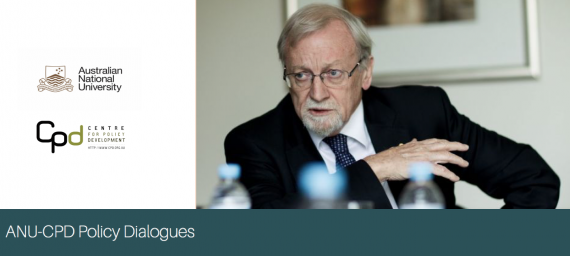This year CPD is excited to partner with the Australian National University (ANU) for a new event series. Co-hosted by the two institutions, the ANU-CPD Policy Dialogues are a series of high-level conversations on some of Australia’s key policy issues. The dialogues are an opportunity for fresh thinking on Australia’s policy processes and strategies. They enable a wider variety of voices (business, professional and philanthropic community leaders) to contribute to a conversation on how to tackle the long-term opportunities and challenges facing Australia. On April 12, CPD was proud to co-host the first event in the series, focussing on Australian foreign policy.
ANU-CPD Policy Dialogues: Gareth Evans in conversation with Allan Gyngell
2017 Australian Foreign Policy White Paper – challenges and opportunities
The Australian Government has committed to releasing a new Foreign Policy White Paper this year, its first since 2003. Developing a new framework to guide our international engagement is a critical task, as Australia encounters a geopolitical environment more challenging than any period since the end of the Cold War. The past twelve months have demonstrated that Australia can no longer take for granted the continuity of advantageous international conditions. If Australia could previously deal with the world as she found it, she must now deal with the world strategically with a view to shaping it, particularly in our region.
How should Australia chart its course in international relations over the next decade? Do we need more strategic capability to understand developments beyond Australia and how best to respond? How can we ensure foreign policy thinking is integrated across government and embedded in Australian society?
These questions were at the heart of the first ANU-CPD Policy Dialogue for 2017. The interactive discussion commenced with ANU Chancellor and former Foreign Minister, the Hon Gareth Evans AC QC, in conversation with Allan Gyngell AO, former diplomat, foreign policy adviser to Prime Minister Paul Keating and Director-General of the Office of National Assessments.
Key points of the  discussion
discussion
Needless to say, Gareth and Allan have a unique vantage points and perspectives on foreign policy, the significance of particular bilateral and institutional relationships, and Australia’s history and impact as a regional and global player.
In his remarks, Gareth Evans emphasised the importance of clearly articulated national interests in guiding effective foreign policy, and argued that these included not only economic and strategic interests but also values-based interests. Successful and sustainable foreign policy requires a strategic and conceptual approach, instead of a reactive approach. He argued that Australia’s foreign policy should be less reflexive in its support for decisions taken in Washington DC, while reiterating our commitment to democratic and human rights values in our relationships in our region.
Allan Gyngell provided an overview of his newly-published book Fear of Abandonment – a review of the history of Australian foreign policy since the second world war. He said that the questions and dilemmas Australian foreign policy makers face today are more difficult than they have been in many decades. However, Australia had a rich history of contributing to and shaping the region and the world, and today’s policymakers must seize key opportunities for Australia to protect the global rules and institutions that matter – especially in a world where we can’t rely on others to do this for us.
This was followed by a wide-ranging discussion with a diverse and expert audience. Participants included: Daniel Flitton (The Age), Denise Cauchi (CEO, Diaspora Action Australia), Dewi Wahab (Indonesian Consul-General, Melbourne), Harrison Young (Director, CBA), Helen Evans (Associate Professor, Nossal Institute for Global Health), Jenny McGregor (CEO, Asialink), Leanne Smith (Associate Director, Whitlam Institute), Michael Rowland (ABC News), Paul Ronalds (CEO, Save the Children), Peter Binks (CEO, BHERT), Peter Mares (Writer and broadcaster), Rachel Ball (Head of Public Policy and Advocacy, Oxfam), Terry Moran (Chair, CPD) ,Martine Letts (CEO, Committee for Melbourne), Sam Byfield (Strategic Planning and Engagement, Victorian Department of Health), Sam Hurley (Policy Director, CPD), Susie Byers (Lead Organiser Political and Community Campaigning, CPSU), Victor Perton (Leadership Adviser and Advocate, Australian Leadership), Steve Skala (Vice Chair, Deutsche Bank), Yassmin Abdel-Magied (Engineer, author and broadcaster) and Travers McLeod (CEO, CPD).
Other key points of the discussion included:
- The importance of Australia having a better sense of its national identity, to give it more clarity and self-confidence as an international actor.
- The need for Australia’s conception of its national interests to reflect the voices and views of a wide range of people in an increasingly diverse and multicultural modern Australian society, not outdated views from our past, or ingrained ideas from a narrow subset of the community.
- Australia’s great and unique opportunity to use the soft-power links of its multicultural society more strategically.
CPD would like to thank Gareth, Allan and the team at ANU House for hosting the event, and participants who contributed to an engaging and expert start to the ANU-CPD Policy Dialogue Series.
You can read a piece from the ABC’s Michael Rowland, who participated in the discussion, here: http://www.abc.net.au/news/2017-04-13/gareth-evans-blasts-donald-trump-urges-pivot-to-asia/8441444.
 Background – CPD’s submission to Foreign Policy White Paper
Background – CPD’s submission to Foreign Policy White Paper
In February, CPD made a submission to the Foreign Policy White Paper process. We made three recommendations:
(1) that policymakers in Canberra “unlock the gates of foreign policy” by involving more domestic constituencies in the policy-making process;
(2) that DFAT boost its strategic policy capability by invest in an Office of Policy Planning; and
(3) that Australia strive for “smart institutionalism”, including a bolder vision for multilateral diplomacy that “connects each institutional engagement to a larger coherent strategy.”
The audience for this event reflected the first of these themes, in that it included both foreign policy experts and other leaders from business, civil society and community organisations with a wider interest in foreign policy.
Key documents and media coverage
“Trump ‘acting on posture, not policies’, says former Australian foreign minister Gareth Evans“, Michael Rowland, ABC News





